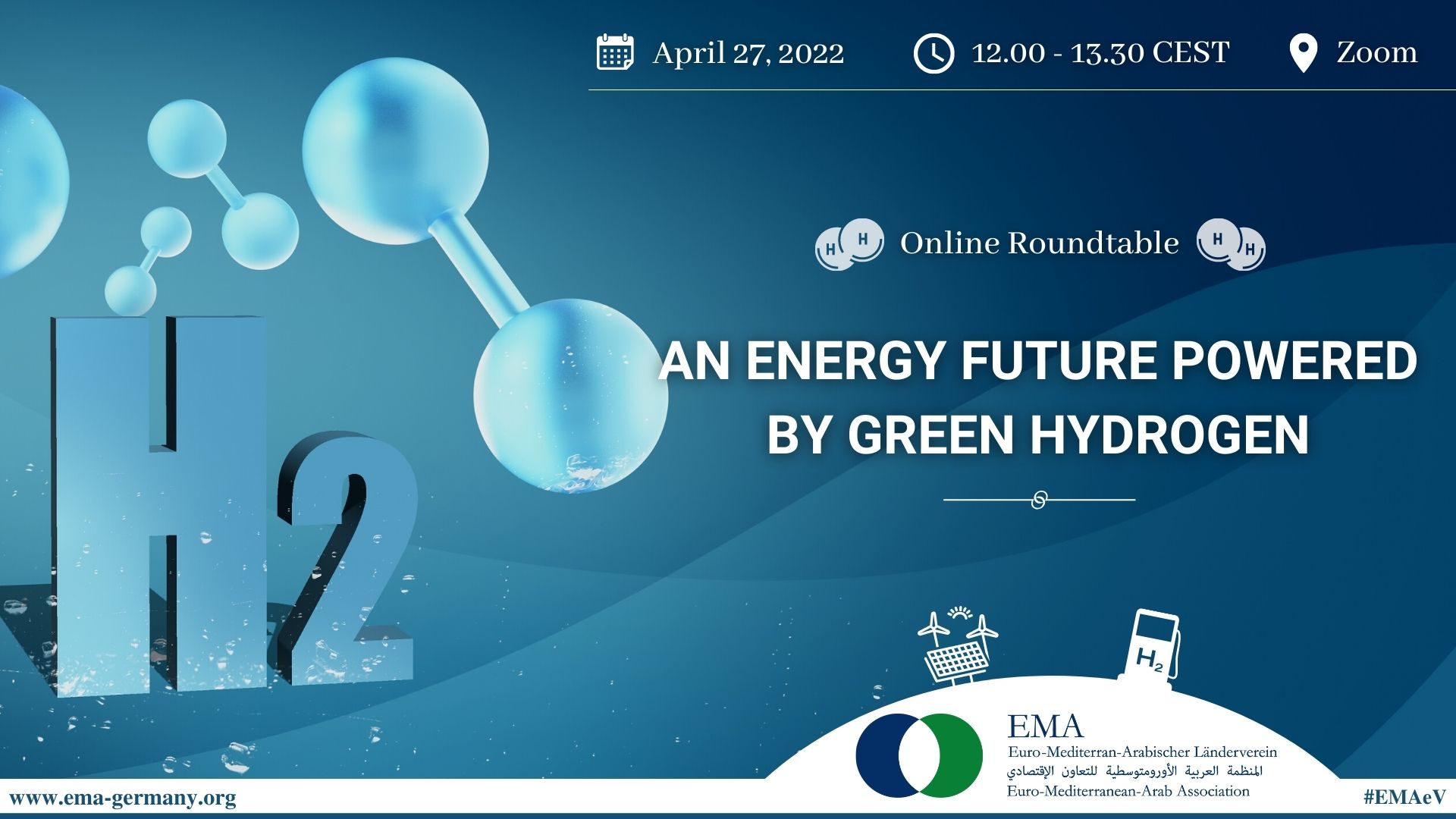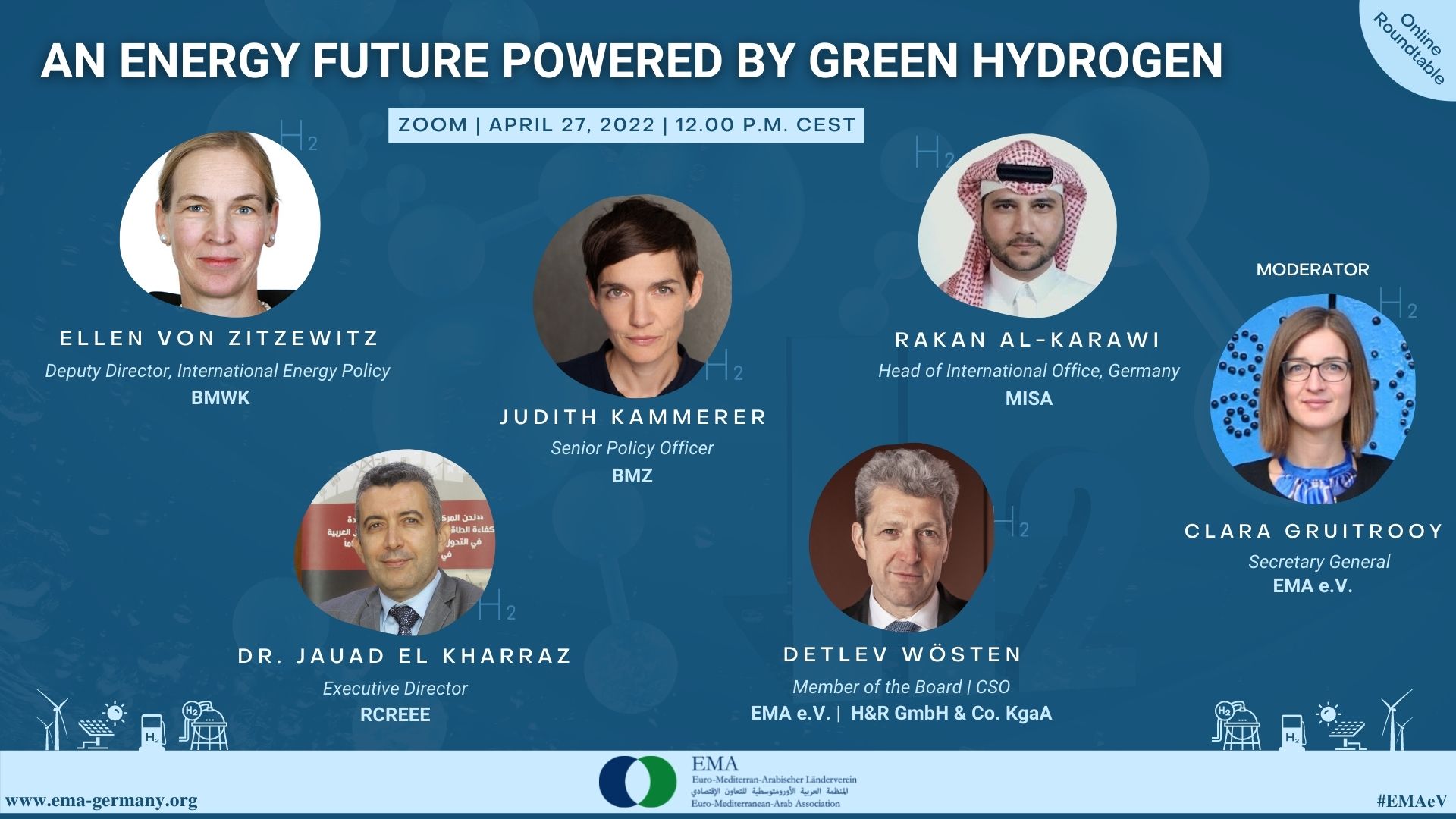
The Euro-Mediterranean-Arab Association EMA would like to invite you to the following exclusive event:
Online Roundtable
An Energy Future Powered by Green Hydrogen
Zoom | April 27, 2022 | 12.00-13.30 P.M. CET
The event language is English
There is broad consensus worldwide that green hydrogen supply is technologically feasible, cost-competitive, and sustainable. It is also the green fuel of choice in the global quest of leading world economies to achieve net zero carbon emissions by 2050. Demand is driven specifically by the shipping and aviation sectors, heavy industries such as steel and petrochemicals, as well as power generators. This entails business opportunities for the German industry along the whole hydrogen value chain including the use of hydrogen for producing synthetic fuels such as e-kerosene.
The German National Hydrogen Strategy 2030 estimates the need for up to three million tons of green hydrogen per year by 2030. Demand is projected to increase to more than eleven million tons per year by 2050. Therefore, Germany encourages research, investments, and trade of green hydrogen and its derivatives. The Strategy includes industrial and research cooperation projects with numerous Arab countries. Especially, the Arab Gulf countries have the potential to produce inexpensive hydrogen from renewable energies and to export green hydrogen to Germany in the short to medium term thus contributing to Germany’s energy security.
Moreover, green hydrogen and other renewable projects are expected to provide excellent opportunities to further diversify the economies of Arab Gulf countries, attract new industrial sectors and investment, as well as create high-tech skilled jobs and training. To name but two examples, Saudi Arabia and Oman invest heavily in the exploration of green hydrogen for their economies and the world market. Saudi Arabia strives to become the world’s biggest exporter of hydrogen. German technology is part of the first Saudi green hydrogen production plant in NEOM, powered by four gigawatts of wind and solar power and thus making it one of the largest in the world. Construction is scheduled to begin in 2022 with production following by 2026. Saudi Aramco is planning its own project of producing green hydrogen. In Oman, large hydrogen projects include a 25 gigawatts project and two smaller projects in Duqm and Salalah. In addition, two of the largest industrial ports in the region are being built in Oman thus setting up the country not only as a producer, but also an exporter of green hydrogen.
The online roundtable sheds light on these developments and aims to bring together policymakers, private sector decision-makers, consultants, as well as researchers in the field of green hydrogen cooperation between Europe and the Mediterranean and Middle East region. Participants can share their questions to the speakers in advance during the registration process. The event language is English.
Driving Climate Action and Business Opportunities across the EMA Region with Green Hydrogen
“It is an exciting time: The Kingdom’s focus is on renewable energy opportunities and hydrogen development”, said Rakan Al-Karawi, Head of the International Office – Germany at the Saudi Arabian Ministry of Investment (MISA), during the online roundtable on green hydrogen organized by the EMA on April 27, 2022, adding that this paves the way for further cooperation opportunities in the renewable energy sector. For example, “NEOM is a project that is looking to be 100 percent based on renewable energy. This City of the Future, the size of Belgium, will offer opportunities in more than 17 sectors with a clear focus on sustainability and transparency.”
The roundtable, moderated by EMA Secretary General Clara Gruitrooy, discussed the developments in the green hydrogen sector between Germany and the Mediterranean and Middle East region and highlighted the importance of approaching the topic from a broad perspective including cooperation possibilities and questions of technological feasibility, cost competitiveness, and investment opportunities surrounding green hydrogen. During the Q&A session, the audience made ample use of their chance to interact with the speakers who answered their questions live or in the chat.
Saudi Arabia as the Kingdom of Opportunities
Mr. Al-Karawi presented the investment infrastructure, renewable energy, and green hydrogen developments in Saudi Arabia. In the last years, the Kingdom has proactively attracted international companies offering investment opportunities and incentives. “As an International company, Saudi Arabian institutions will guide you step-by-step in the evaluation of opportunities”, added Mr. Al-Karawi. The Kingdom is a fertile land of opportunities and one of the fastest-growing markets in the region. The launch of the Vision 2030 six years ago has strengthened the ambitions for Saudi Arabia’s social, economic, and cultural transformation. In addition, the national investment strategy includes a wide range of facilitation for investors including a reduction of the license approval period and the time for visa issuance.
Job Creation and Capacity Building through Green Hydrogen
Green hydrogen and related renewable projects are expected to provide excellent opportunities to further diversify and develop the economies of Arab countries, attract new industrial sectors and investments, as well as create high-tech skilled jobs and training. According to Mr. Al Karawi, NEOM alone will see approximately 380,000 new jobs by 2030. Thanks to its strengths in the technical and vocational education and training sector, Germany could contribute its TVET expertise to Arab labor markets.
Local job creation and supporting education, research, and development is also one of the objectives of the MENA Hydrogen Alliance, of which the Regional Center for Renewable Energy and Energy Efficiency (RCREEE) based in Cairo has been a member since 2021. According to RCREEE Executive Director Dr. Jauad El Kharraz, capacity building is critical to reaching the targets in the fields of green hydrogen, renewable energies, and energy efficiency.
“Green Hydrogen is considered a key for the energy transition and a balancing tool for renewables”
Dr. El Kharraz continued the discussion by focusing on the potential of renewable energies and green hydrogen in the region. Stressing the importance of green hydrogen, he mentioned that “green hydrogen is considered a key for the energy transition and a balancing tool for renewables.” Renewable energy is becoming more and more important in the energy policies of the MENA countries with rapidly increasing political and economic will in the region for a green energy transition. The goals are ambitious but achievable, said Dr. El Kharraz, giving the example of Morocco, which is expected to generate 52 percent of its energy needs from renewable energies by 2030. Despite serious challenges in terms of water needs and funding of hydrogen technologies, he stated that cost reduction and efficiency gains are achievable.
The Global Energy Transition: German-Arab Hydrogen Cooperation
“The federal government of Germany has between 25 to 30 energy partnerships around the world. The MENA region is one of our focus regions due to its cooperation potential”, said Ellen von Zitzewiz, Deputy Director of International Energy Policy at the German Ministry for Economic Affairs and Climate Action (BMWK). Due to their geographic proximity, some of the most important partners include the Mediterranean and Middle Eastern countries namely Morocco, Algeria, Tunisia, and Saudi Arabia among others.
The Gulf region has a high potential for hydrogen production. Mrs. von Zitzewitz pointed to the example of the cooperation between Germany and Saudi Arabia regarding the NEOM project and to Oman. She stated that Germany’s energy cooperation with the Arab Gulf countries intends to promote the exchange of experience between governments and to improve legislation and regulations. For instance, in Oman, five projects are currently planned and the capacity expectations range from 20MW to 14GW.
Private Sector Engagement in Achieving Climate Neutrality
Following Mrs. von Zitzewitz’s presentation, EMA board member and CSO of H&R GmbH & Co. KGaA Detlev Wösten emphasized that his company recognizes its important role in influencing its customers to become climate neutral and stressed the urgency that the private sector, in general, should pursue an ecological approach. Being an energy-intensive company, H&R has a long-term commitment to renewable energies such as green hydrogen and is a pioneer in electrolysis hydrogen capacity with its own Power-to-Liquid demonstration plant set to begin operations in Hamburg in 2022. H&R operates in Europe, Asia, and Africa and deals with base materials for chemical and pharmaceutical businesses in 100 different industries. “Tightening bonds with our friends in the MENA region will be a cornerstone, not only for H&R, not only for the chemical industry, but for Europe and Germany in a wider sense”, concluded Mr. Wösten.


